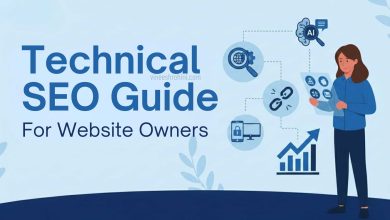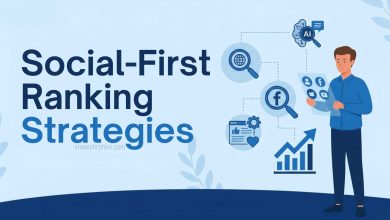On-page SEO vs. Off-page SEO: What Is the Difference
Introduction
Search Engine Optimization (SEO) is an essential digital marketing strategy that aims to improve the visibility and ranking of a website in search engine results pages (SERPs). SEO can be divided into two main categories: on-page SEO and off-page SEO. On-page SEO refers to the optimization techniques applied to a website’s content and HTML source code, while off-page SEO refers to the optimization techniques applied outside of a website, such as link building and social media marketing. In this essay, we will explore the differences between on-page SEO and off-page SEO and how they can be used to improve a website’s visibility and ranking in SERPs.
On-Page SEO
On-page SEO refers to the optimization techniques applied to a website’s content and HTML source code. On-page SEO aims to make a website more visible and relevant to search engines, as well as more user-friendly for website visitors. Some of the key elements of on-page SEO include:
- Keyword Research
Keyword research is a crucial part of on-page SEO. Keyword research involves identifying the words and phrases that people use to search for information related to a website’s products or services. Keyword research helps website owners to optimize their website’s content around the most relevant and high-traffic keywords.
- Title Tag Optimization
Title tags are HTML elements that describe the title of a web page. Title tags are important for on-page SEO because they help search engines to understand the content of a web page. Title tags should be relevant, descriptive, and include the target keyword.
- Meta Description Optimization
Meta descriptions are HTML elements that provide a brief summary of the content on a web page. Meta descriptions are important for on-page SEO because they can impact click-through rates from search engine results pages. Meta descriptions should be relevant, descriptive, and include the target keyword.
- Header Tag Optimization
Header tags are HTML elements that organize the content on a web page. Header tags are important for on-page SEO because they help search engines to understand the structure and hierarchy of the content. Header tags should be used to highlight the main points and sub-points of the content, and should include the target keyword.
- Content Optimization
Content optimization is the process of optimizing the text and multimedia content on a web page to make it more relevant and user-friendly. Content optimization involves using the target keyword in the content, as well as using related keywords and synonyms to make the content more comprehensive.
Off-Page SEO
Off-page SEO refers to the optimization techniques applied outside of a website, such as link building and social media marketing. Off-page SEO aims to increase the authority and relevance of a website by building backlinks from other websites and creating a strong social media presence. Some of the key elements of off-page SEO include:
- Link Building
Link building is the process of acquiring backlinks from other websites. Backlinks are links from other websites that point to a website’s content. Backlinks are important for off-page SEO because they signal to search engines that other websites consider a website’s content to be authoritative and relevant.
- Social Media Marketing
Social media marketing is the process of using social media platforms to promote a website’s content and engage with its target audience. Social media marketing is important for off-page SEO because it can increase a website’s visibility and authority, as well as drive traffic to the website.
- Local SEO
Local SEO is a type of off-page SEO that focuses on optimizing a website’s presence in local search results. Local SEO involves creating local business listings, building local citations, and optimizing the website’s content for local keywords.
- Guest Blogging
Guest blogging is the process of writing blog posts for other websites and including a backlink to the author’s website. Guest blogging is important for off-page SEO because it can increase a website’s visibility, authority, and backlink profile.
Differences Between On-Page SEO and Off-Page SEO
The primary difference between on-page SEO and off-page SEO is the focus of the optimization techniques. On-page SEO focuses on optimizing a website’s content and HTML source code, while off-page SEO focuses on building a website’s authority and relevance outside of its own pages. On-page SEO aims to make a website more visible and user-friendly, while off-page SEO aims to increase a website’s authority and backlink profile.
Another key difference between on-page SEO and off-page SEO is the level of control that website owners have over each type of optimization. On-page SEO is largely within the control of website owners, as they can directly edit and optimize their website’s content and HTML source code. Off-page SEO, on the other hand, is largely outside of the control of website owners, as it involves building relationships and earning backlinks from other websites.
Benefits of On-Page SEO and Off-Page SEO
Both on-page SEO and off-page SEO are essential for a comprehensive SEO strategy. Some of the key benefits of on-page SEO include:
- Increased visibility in search engine results pages
- Improved user experience for website visitors
- Higher click-through rates from search engine results pages
- Higher conversion rates due to more relevant and user-friendly content
- Increased website authority and relevance in the eyes of search engines
Some of the key benefits of off-page SEO include:
- Increased website authority and relevance in the eyes of search engines
- Improved backlink profile, which can lead to higher search engine rankings
- Increased visibility and traffic from social media platforms
- Increased visibility and traffic from local search results
- Improved relationships with other websites in the same industry or niche
Conclusion
On-page SEO and off-page SEO are two essential components of a comprehensive SEO strategy. On-page SEO focuses on optimizing a website’s content and HTML source code, while off-page SEO focuses on building a website’s authority and relevance outside of its own pages. Both types of SEO have their own unique benefits, and both are necessary for a website to achieve high search engine rankings and attract more targeted traffic. By implementing both on-page and off-page SEO techniques, website owners can create a comprehensive SEO strategy that will help them achieve their digital marketing goals.



